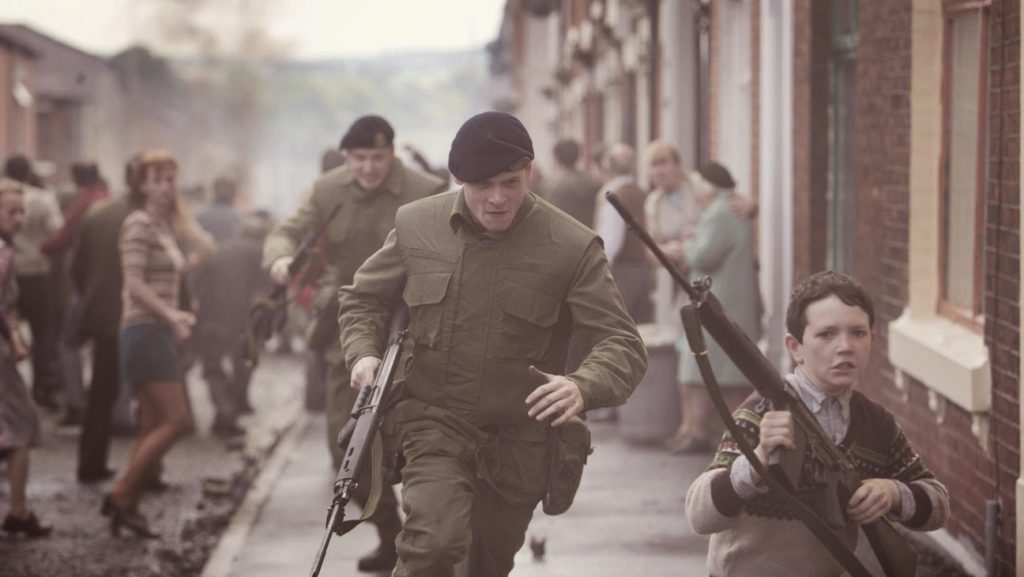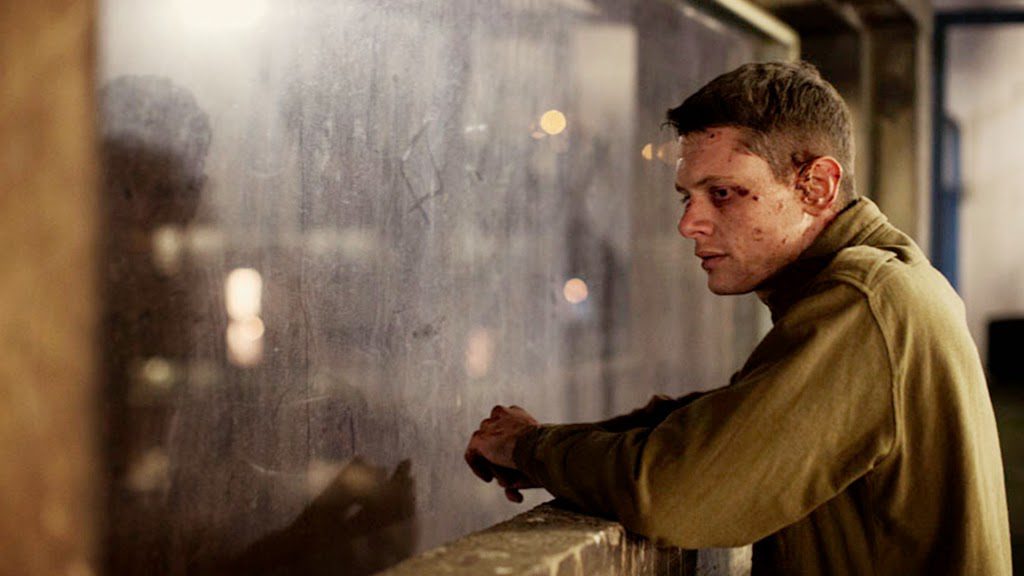There is scarcely a glimpse of true color to be seen in ’71, apart from the occasional piercing pop of Jack O’Connell’s sky-blue eyes. Yann Demange’s fumbling, gripping tale of a soldier trapped behind enemy lines, it takes place in a washed-out landscape of grimy greys, dirty browns, and burnt-out fire-orange. Unfortunately, that sense of abiding murkiness extends to Gregory Burke’s screenplay, which assembles a motley bunch of Irish gangsters and does little to differentiate them. But even if ’71‘s storytelling is muddled, its execution is consistently riveting. Directing his first feature, Demange has made a pulse-pounding thriller that demonstrates a bone-deep understanding of filmmaking suspense. It’s scary to think of what he could do with a more attentive script.
The latter two-thirds of ’71 are imbued with a feverish, exhausting tension, but it begins as something far different: a touchingly humane platoon picture. O’Connell stars as Gary Hook, a young private in the British Army who’s going through the usual grueling training regimen, running great distances with a rifle slung across his back before crawling through the mud. But his commanding officers, rather than peppering him with the typical accusations of worthlessness (think Full Metal Jacket), preach loudly and encouragingly about the virtues of teamwork. “Help each other!” one CO barks as Hook and his comrades attempt to scale a mock wall. It’s a seemingly straightforward command that ’71, as it descends deeper into desperation, distorts and refracts with chilling ambiguity.
Hook’s regiment gets assigned to Belfast, instructed to keep the peace between the warring Protestants and IRA Catholics. You don’t need a doctorate in Irish History to know that that’s easier said than done, but Hook’s new commandant, the sweet-natured, open-faced Lieutenant Armitage (Sam Reid, very good), favors diplomacy over force. “We need to go out there and reassure people,” he explains while refusing to equip his soldiers with riot gear. Is this a gesture of nobility or a blunder of naiveté? Did I mention that this movie takes place in 1971 Belfast?
It’s a place that, as Demange shoots it, is synonymous with Hell, and it doesn’t take long before all hell breaks loose. While out on some sort of investigative patrol—the details are never specified, nor do they matter—Hook and his cohorts quickly learn that, as much as the Catholics and Protestants hate one another, they aren’t exactly fans of the British either. Things begin amusingly enough, with children mischievously lobbing plastic bags of urine toward the grunts. But when those bags are replaced by rocks, the laughter turns to screams, and suddenly the street teems with throngs of dissatisfied citizenry snarling at the panicky troops. In a brilliantly orchestrated sequence, Demange constantly cuts between the shouting factions, upping the jittery tension until it explodes into a riot. A soldier loses his rifle, and there goes Hook, first sprinting frantically into the crowd to recover the gun, then running like mad from two pistol-wielding teens. The foot chase is yet another breathless set piece, equal parts chaos and clarity; Demange uses a handheld camera to provide immediacy, but he nevertheless skillfully maps out the geography of the pursuers and the pursued. Hook eventually escapes, but he quickly realizes that his victory is Pyrrhic: His regiment has fled, and he’s stranded in hostile territory, an unwelcome interloper in a strange, savage land.
From there, ’71 settles into rhythm as an episodic thriller. Hook, in order to make his way back to his barracks, must navigate a series of life-threatening challenges. Various people want him dead, whether it’s an especially militant sect of the IRA or a less blusterous (but no less dangerous) band of bomb-toting Protestants. He’s lost without help, and so he warily befriends a plucky young boy (Corey McKinley), then finds temporary sanctuary in the home of an elderly doctor (Fortitude‘s Richard Dormer) and his petrified daughter (Charlie Murphy). (As must always happen in a movie like this, there is a scene where Hook screams in agony as the doctor stitches up his wound without the benefit of an anesthetic.) He is never in one place for too long, and Demange mines enormous suspense from his predicament, most notably during an electric sequence of cat-and-mouse set on the balconies and stairways of an apartment building that concludes with a hauntingly intimate stabbing.
As compelling as ’71 is when it keeps its focus on Hook and his escalating fear, it stumbles whenever it tries to expand its scope, which it does all too often. Not content with merely making a spellbinding thriller, Demange also strives to create an underworld noir, one that explores the shifting allegiances and nefarious misdeeds of operatives on both sides of this catastrophic war. It’s difficult to blame him for seeking to broaden his canvas, and certainly the IRA-Protestant conflict is rife with cinematic possibility, with its shadowy backroom dealings, its double-crosses, its traitors in the midst. The problem is that, as intrinsically appealing as these pulp elements may be, they’re presented here with a sloppiness that borders on incoherence. It is not as though Burke needed to carefully concoct a specific agenda and backstory for each of his minor ne’er-do-wells, but their overriding blankness results in confusion rather than intrigue. (It also doesn’t help that many of them look disturbingly alike, either mustachioed redheads or close-cropped brunets.) Demange cut his teeth making miniseries for British TV, and at times, ’71 suggests it might work well on television, with particular episodes examining the corruptive antics of the British Captain Browning (Sean Harris) or the strained politics of IRA leader Boyle (David Wilmot). (To enhance this impression, one of Browning’s thuggish subordinates is played by Paul Anderson, who portrays Cillian Murphy’s doltish older brother on the BBC’s Peaky Blinders.) As a movie, though, ’71 can feel frustratingly, tantalizingly incomplete.
Perhaps the greatest disappointment of this diffuse approach is that it robs us of additional time spent watching O’Connell, who has rapidly emerged as one of the more talented young actors working today. American audiences will recognize him as the sturdily heroic center of Angelina Jolie’s Unbroken, but his greatest performance to date is as the tempestuous convict in David Mackenzie’s prison drama Starred Up, where he combined volcanic rage with suppressed, anguished melancholy. That ferocity makes his quiet work in ’71 all the more revelatory. Hook doesn’t traverse a typical emotional arc—he barely even talks—but O’Connell burrows into the role, expressing his green soldier’s persistent terror with painful poignancy. It’s a subtly powerful performance that provides this volatile, angry film with an achingly human center.
’71 is not a perfect movie. Its screenwriting is careless, and while it hints at themes of religious strife and fragmented loyalty, it never satisfactorily communicates them. It also should have ended five minutes before it does (though within those unnecessary five minutes, Demange pays striking homage to, if you can believe it, Kathryn Bigelow’s Point Break). But it is a consistently emphatic and sometimes emphatically great work, and its messiness often contributes to its feral energy. At its best, ’71‘s subplots and supporting characters melt away, and it becomes a simple story about a helpless, desperate man, scrapping and clawing to fight his way home. In this, Demange and O’Connell illustrate that directors and their actors, like all platoon mates, can help each other.
Jeremy Beck is the editor-in-chief of MovieManifesto. He watches more movies and television than he probably should.


